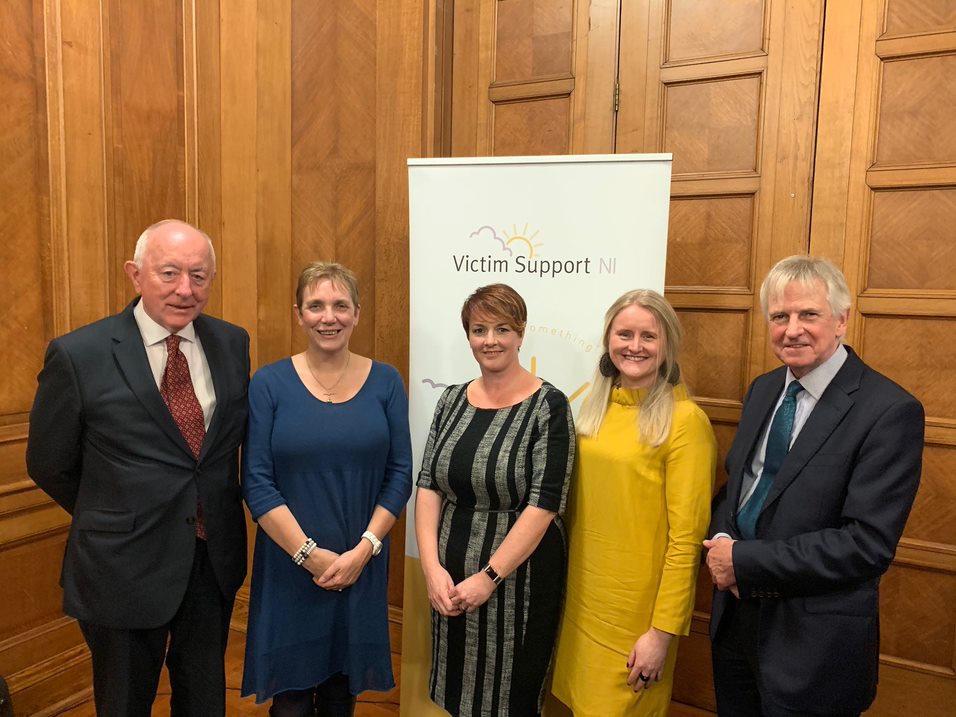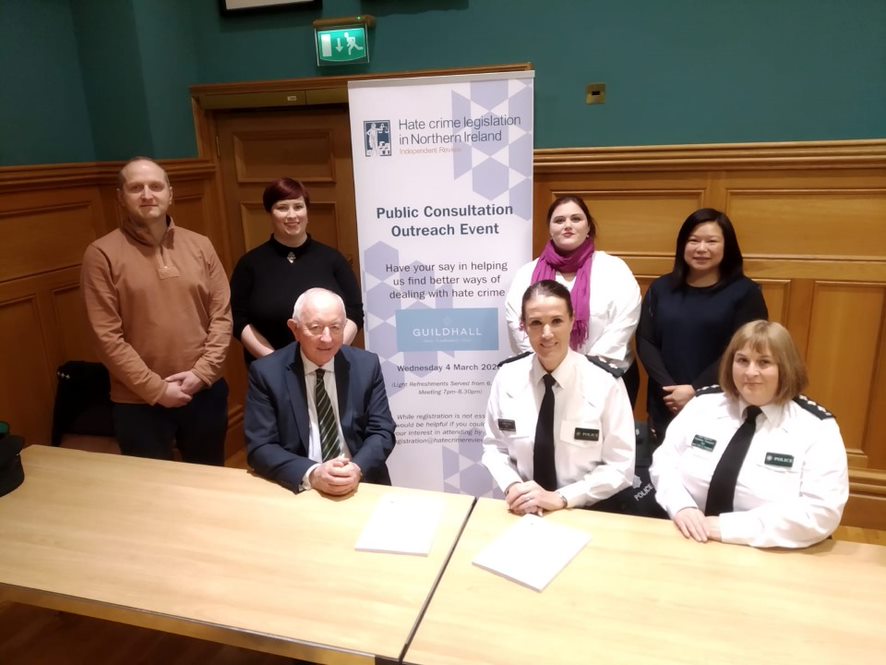“Crime – any crime – is a tragedy, and even more so when you are targeted for ‘who you are’.” Michael Avila, Hate Crime Advocacy Coordinator at Victim Support NI, responds to Judge Desmond Marrinan’s independent review of hate crime legislation in Northern Ireland, published this month.
Historically, hate crime legislation in Northern Ireland has lagged behind its counterparts in Britain and in the Irish Republic. Today, these crimes remain disturbingly underreported and the issue rarely reaches a courtroom. In its current form, it’s fair to say that the law is failing victims and urgent reform is needed. This month we witnessed what are hopefully the first steps towards bridging the gap between NI and other jurisdictions across these islands with the publishing of Judge Desmond Marrinan’s latest ‘Independent Review of Hate Crime Legislation in Northern Ireland’ on 1st December.
One organisation highly invested in serving victims of hate crime is Victim Support NI through its Hate Crime Advocacy Scheme. Having recently joined the organisation as its new Hate Crime Advocacy Coordinator, I thought it pertinent to analyse Judge Marrinan’s recommendations and provide some insight from those working on behalf of victims across Northern Ireland.
Here, we consider the work of the Hate Crime Advocacy Scheme (HCAS); the context in which Judge Marrinan’s recommendations have been made; the impact that they may have on the Advocacy Scheme; and, finally, what all of this may mean for the future of justice in Northern Ireland.

What is the Hate Crime Advocacy Scheme (HCAS)?
Introduced in 2013, the HCAS is jointly funded by the NI Department of Justice and the PSNI. It is coordinated by Victim Support NI in partnership with specialist advocacy organisations covering designated hate crime categories in NI: the Rainbow Project (LGBT), Leonard Cheshire (disability) and the Migrant Centre NI (race). Victim Support also assists victims of sectarian-motivated hate crime. All services supporting victims and witnesses of crime are provided free of charge.
The scheme aims to improve support for victims, increase confidence in and encourage effective reporting, reduce barriers and widen access to the criminal justice system.
The scheme provides:
- 1:1 support for victims of hate crime or incidents
- Third party reporting of crimes or incidents on behalf of the victim to the PSNI
- A liaison between PSNI and relevant support agencies including, for example, the NI Housing Executive
- Facilitation of monthly meetings with the PSNI to raise any issues
- Outreach events to increase awareness of hate crime and the Scheme
Racially-motivated hate crime is the most common offence in Northern Ireland, followed by sectarian, homophobic, disability and transgender-related crimes and incidents.
Needless to say, being a victim of hate crime is extremely traumatic, not only for the individual, but for whole communities who also often live in fear of being targeted. What’s often forgotten is how difficult the investigation and judicial processes can be. These can have even further negative impacts on individuals and witnesses as they endure what can be a drawn out, often bureaucratic and re-traumatising experience that can take several years. With compassion, Hate Crime Advocates aim to support individuals through these processes, lending an empathetic and helping hand.
Hate Crime Legislation: A Historical Context
Having considered the impact on victims of hate crime, the law’s current attempts at bringing perpetrators to justice through criminal sentencing have been insufficient.
Since 2004, NI’s justice system has utilised limited ‘bolt-on’ provisions to enhance sentences for perpetrators of hate crime. Someone who commits an assault, for example, may be sentenced to two years imprisonment, but this could be increased if the crime was proven to be motivated by hate. Failures of this approach have been widely documented, particularly because the hate motivation is frequently dropped from cases before they even reach court. In Northern Ireland there has never existed legislation that records hate crime as an offence in and of itself.
This will hopefully change. If implemented, Judge Marrinan’s recommendations would mean that all hate-related law would be consolidated into one piece of legislation. As a result, all existing criminal offences will be subject to an ‘aggravated offence’ model and would be legally recorded, prosecuted and appropriately punished as hate crimes. Officially recording crimes as such would also act as a deterrent to would-be perpetrators committing these offences. In addition, it would give us a better idea of the true scale of hate crime across Northern Ireland.
Whereas hate crimes have historically been limited to the categories of race, religion, sexual orientation and disability in Northern Ireland, Judge Marrinan’s recommendations call for an expansion of these. This would include sex/gender and age discrimination. It would also see the introduction of legislation that accounts for ‘intersectionality’. That means, when a hate crime is committed towards someone for multiple hate-motivated reasons (i.e. both sexual orientation and race).
For too long hate crimes have remained incredibly difficult to prove and prosecute. With these recommendations, Advocates see it as their duty to actively persuade lawmakers to make the relevant processes more accessible and transparent, more effective and more victim-centric.

A Closer Look at the Recommendations
New Hate Crime Definition
Judge Marrinan’s recommendations include a new definition of a hate crime. This is, “A hate crime may be defined as a criminal act perpetrated against individuals or communities with protected characteristics based on the perpetrator’s hostility, bias, prejudice, bigotry or contempt against the actual or perceived status of the victim or victims.”
The inclusion of ‘hostility, bias, prejudice, bigotry or contempt’ is part and parcel of Judge Marrinan’s holistic approach to addressing hate crime.
Further Recommendations include:
- A new, consolidated law, which includes both crimes motivated by hate and speech which stirs up hatred. Hate speech will continue to have a high threshold of proof to ensure the law upholds free speech rights
- Age and Gender, including Transgender, to be added as protected groups
- Definition of ‘sectarian’ hate crime to be adopted, based on the two ‘majority’ communities
- Establishment of a Hate Crime Commissioner for NI
- Implementation of restorative justice practices to curb hate crime and reach community resolutions prior to official court proceedings
- A legal obligation for statutory agencies (councils, Department of Infrastructure, NI Housing Executive) to remove hate speech of any form from public spaces
- Expand the Hate Crime Advocacy Scheme (HCAS) and make funding permanent with statutory support
- The HCAS shall also add dedicated advocates for religious/sectarian and gender-based hate crime, including transgender
What the Advocates think
I am pleased to say that colleagues throughout the advocacy sector have largely welcomed Judge Marrinan’s recommendations. Most of what has been petitioned for by stakeholders to bolster NI’s hate crime provisions, we believe, has been met. There has also been broad acceptance across the sector that the recommendations have struck an appropriate balance between protection and justice for victims and free speech rights.
The recommendations haven’t been received entirely without criticism. Some organisations have expressed views that the review should have gone further to explicitly include legislation on ‘misogynistic’ hate crime and protect refugees and asylum seekers of LGBT backgrounds. Questions have been raised as to whether the proposed independent body to deliver restorative justice solutions may face challenges without significant representation from within the communities affected.
Suggestions have been made that any legal change should be bolstered by funding to provide more CCTV infrastructure in areas with high levels of hate crime to make it easier to report and prosecute.
It is worth pointing out that Judge Marrinan’s report does detail opposition from mostly religiously conservative individuals opposed to many of the recommendations relating to transgender/LGBT communities and freedom of speech.
Overall, however, most feedback has been overwhelmingly positive from organisations highly invested in enhancing NI’s hate crime legislation to better protect victims.
Of course, currently these are merely recommendations. It is now up to the Department of Justice to consider and implement them.
The Future of the HCAS
Traditionally, the scheme has been surviving on a year-to-year basis, never knowing whether funding will be allocated and if victims will continue to receive the much-needed services they depend on. At present, this is still the case for this financial year.
A consultation of the HCAS was included in Judge Marrinan’s review (pp. 452-459). Organisations and stakeholders across the sector confirmed what we already believed to be true at Victim Support NI – that the Scheme is having a resoundingly positive impact on individuals and communities affected by hate crime. It is with cautious optimism that we received the recommendation that the Hate Crime Advocacy Scheme ought to be made permanent, ‘statutory-bound’ and expanded, with the addition of new religious/sectarian and gender Hate Crime Advocates. This, we believe, will better increase our capacity to serve a wider range of victims.
Crime – any crime – experienced by anyone is a tragedy, and even more so when you are targeted for ‘who you are’. No one should be left alone after such an experience, but they often feel that way as they move through the judicial process. The Hate Crime Advocacy Scheme aims to change that in whatever small and meaningful way we can.
It is with that sentiment that we eagerly await the Department of Justice’s consideration and implementation of Judge Marrinan’s recommendations and, coincidingly, the enhancement of support that victims of hate crime across Northern Ireland require.
If you or someone you know has been a victim of hate crime and wish to access Victim Support NI’s free advocacy services, please contact them at:
Phone: 028 9024 3133
Hate Crime: hate.crime@victimsupportni.org.uk
Foyle: foyle@victimsupportni.org.uk
Belfast: belfast@victimsupportni.org.uk
